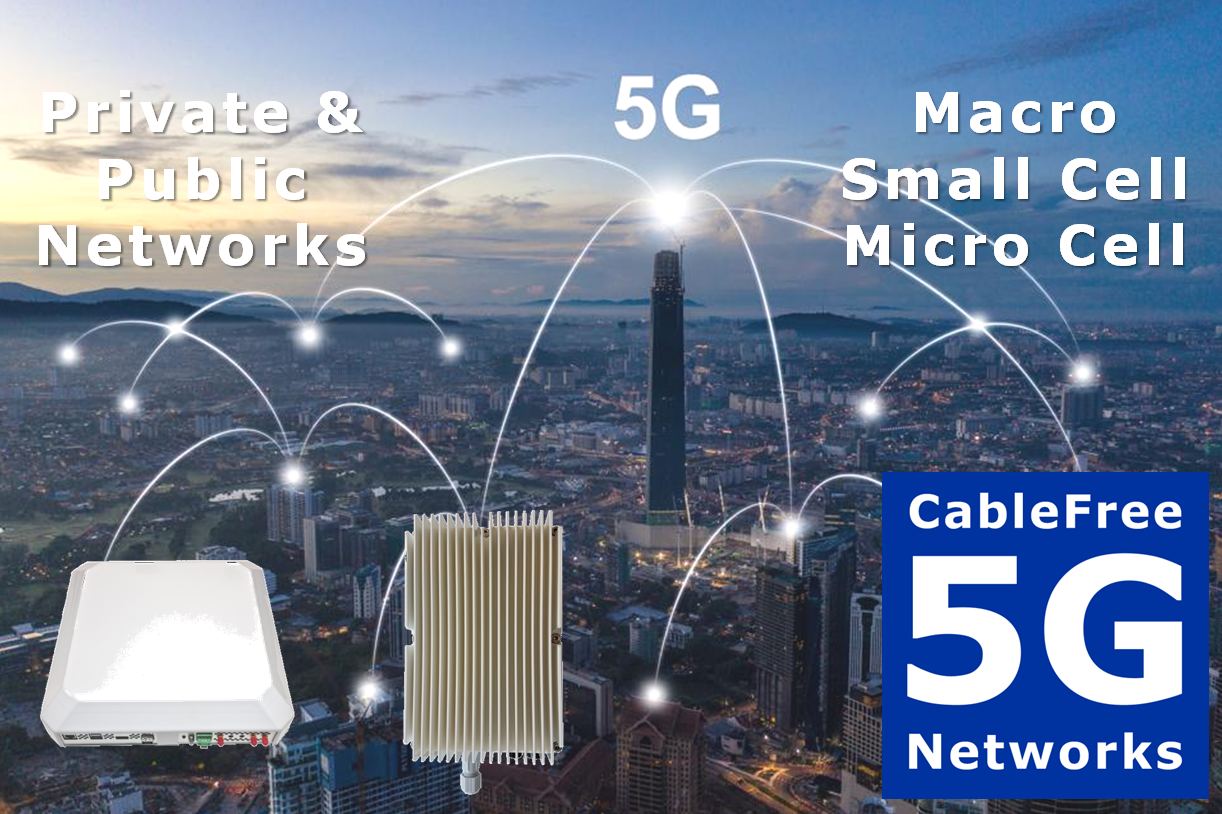CableFree Private 5G networks have the potential to revolutionise campus networks by providing end users with numerous benefits, such as improved coverage, increased capacity, convenience, and enhanced network security. In this article, we’ll explore these and examine why a CableFree 5G Private Network is an excellent option for modern wireless network implementation.

Why Build a Private 5G Network?
A Private 5G network, utilising advanced technologies such as CableFree 5G radios, offers a range of benefits compared to traditional WiFi networks or even public 5G networks. Here, we’ll explain these benefits in detail:
1. Security of Private 5G

Private 5G networks provide a FAR higher level of security compared to WiFi or Public 5G networks. Private 5G Networks offer dedicated and isolated network resources, making it more challenging for unauthorised access and potential cyberattacks. In 5G, the data is fully encrypted from the user device/terminal all the way to the 5G core. 5G encryption is to the highest commercial standards and so far has not been broken.
In a Private 5G network this core is usually physically “on site” and locally managed. This is crucial for industries and applications that handle sensitive data, such as financial institutions, healthcare facilities, and manufacturing plants.
2. Quality of Service (QoS)

Private 5G networks offer superior QoS, ensuring consistent and reliable connectivity even in high-density environments. This is crucial for applications that require low latency and high reliability, such as industrial automation, robotics, and real-time video surveillance. There are many Quality of Service features designed into the 5G standard that ensure that QoS is far higher than available with WiFi, for comparison.
A related topic is roaming: When correctly configured, 5G can do seamless handover between adjacent cells, without dropping user traffic. WiFi cannot do this “true mobility”: only cellular standards can do this today.
3. Freedom from Interference

Private 5G networks operate on licensed spectrum, which means they are less susceptible to interference compared to public WiFi networks, which operate in unlicensed spectrum with many other users trying to use the same frequencies. This is also particularly important in industrial settings where electromagnetic interference can disrupt operations. With dedicated spectrum, these networks can provide a more stable and predictable connection. In many countries, there is dedicated spectrum allocated for Private networks with cost-effective pricing.
4. High Capacity
Private 5G networks offer a significantly higher real-world capacity compared to traditional WiFi networks. They can handle a larger number of connected devices simultaneously without sacrificing performance. This is beneficial for scenarios like smart factories, where numerous IoT devices need to communicate seamlessly. Though the “headline figure” for WiFi capacity looks high, the real-world figures are generally 50% or less than these, due to various factors.

5. Benefits Compared to WiFi
- Coverage and Range: Private 5G networks can cover larger areas with fewer base stations compared to WiFi, making them suitable for expansive industrial sites. 5G has a far more sophisticated radio architecture that ensures that clients with weak signals will still connect far better than any WiFi radio can, without affecting other clients with stronger signals on the same sector/radio.
- Consistent Performance: Unlike WiFi, which can suffer from congestion and performance degradation in high-density areas due to interference and “black spots” in coverage, private 5G networks ensure consistent performance even with a large number of connected devices.
- Security: While WiFi networks are susceptible to various security vulnerabilities, private 5G networks offer advanced encryption and authentication mechanisms, reducing the risk of data breaches. The data is fully encrypted all the way from the 5G terminal device to the 5G core, leaving no “attack vectors” open between these points.
6. Ownership Benefits for Private 5G

Private 5G networks provide full control and ownership over the network infrastructure. This means organizations can tailor the network to their specific needs, optimise it for their applications, and have direct control over network management and upgrades.
The Cost of Ownership of a Private 5G network is usually considered low compared to leased or operator-provided services. The end user can fully own the equipment as an asset, and can depreciate the asset against tax in many cases.
A CableFree Private 5G Network features advanced Network Management Systems (NMS) which offers “single pane of glass” visibility of the complete 5G Network, enabling Network Managers to optimise the network and ensure maximal uptime and Quality of Service for user applications.
7. Industrial Applications
Private 5G networks are particularly advantageous in industrial settings. They enable factory automation, machine vision systems, real-time monitoring, control, and automation of critical processes, leading to increased efficiency, reduced downtime, and improved safety.

8. Edge Computing
Private 5G networks can be integrated with edge computing capabilities, allowing data processing to occur closer to the source. This reduces latency and enables real-time decision-making, which is crucial for applications like autonomous vehicles and augmented reality.
9. Regulatory Compliance
In some industries, regulatory requirements necessitate data privacy, security, and control that can be better achieved with a 5G network. With the 5G core implemented on-site, all the customer data remains on-site and does not leave the customer premises. This is a strong contrast to public cellular systems where all the traffic passes through the national operate core.
10. Future-Proofing
Investing in a private 5G network, such as one utilizing CableFree 5G radios, provides a future-proof infrastructure that can accommodate emerging technologies and applications without significant reconfigurations. CableFree radios are software-upgradable to future 5G releases and feature reconfigurable radio hardware which greatly adds to flexibility and upgrade path.
Private 5G Summary:
In summary, a 5G network using latest technology CableFree 5G radios offers enhanced security, reliable connectivity, freedom from interference, high capacity, true mobility and several other benefits compared to traditional WiFi networks. It’s particularly valuable for industries with stringent security requirements and applications demanding low latency and high reliability. The ownership benefits and flexibility of customisation further make it an attractive choice for organisations looking to leverage the full potential of 5G technology.
For Further Information
For further information on Applications and Solutions for the range of CableFree wireless networking products please Contact Us

You must be logged in to post a comment.